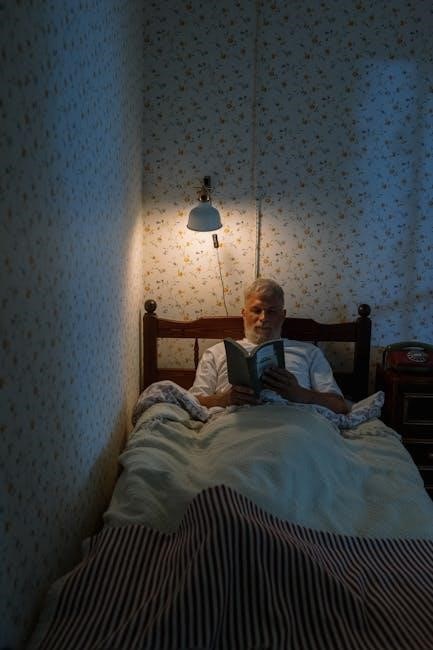“Night” by Elie Wiesel is a powerful Holocaust memoir recounting his harrowing experiences in Nazi concentration camps, exploring themes of faith, hope, and survival. Available as a PDF, it remains a crucial educational resource, offering a poignant testimony of one of history’s darkest periods.
1.1 Overview of the Book

Night by Elie Wiesel is a haunting memoir detailing his experiences as a young Jewish boy during the Holocaust. The book recounts his time in Auschwitz and Buchenwald concentration camps, where he witnessed unimaginable horrors and struggled to maintain his faith. It explores themes of survival, loss, and the father-son bond, offering a deeply personal account of one of history’s darkest periods. Available as a PDF, the memoir remains a vital resource for understanding the Holocaust’s impact on individuals and humanity.
1.2 Importance of the Memoir
Night by Elie Wiesel is a vital testimonial to the Holocaust, offering a deeply personal and harrowing account of survival. As a Nobel Peace Prize laureate, Wiesel’s memoir serves as a powerful warning against hatred and oppression. Its availability as a PDF ensures accessibility for educational purposes, preserving the memory of the Holocaust and its impact on humanity. The memoir remains a crucial resource for understanding the horrors of the past and promoting tolerance and peace in the present.
1.3 Historical Context
Night by Elie Wiesel is set during World War II, recounting the author’s experiences as a young Jewish boy in Nazi-occupied Europe. The memoir vividly depicts the Holocaust, a genocide in which six million Jews were systematically murdered by the Nazis. Wiesel’s account provides a personal perspective on life in Auschwitz and Buchenwald concentration camps, highlighting the brutality and dehumanization of the era. The historical context underscores the memoir’s significance as a firsthand testimony of one of the darkest chapters in human history, now widely accessible in PDF format for educational and reflective purposes.

Background and Publication History
Night by Elie Wiesel was first published in 1958, originally written in Yiddish. Its global acclaim led to translations, making it accessible in multiple formats, including PDF.
2.1 Original Yiddish Version
Night was originally written in Yiddish by Elie Wiesel in 1955 under the title Un di Velt Hot Geshvign (“And the World Remained Silent”). This raw, unflinching account of his Holocaust experiences was later translated into French and other languages, with the English version emerging in 1960. The Yiddish manuscript, though less commonly read today, remains a vital piece of Holocaust literature, offering a deeply personal and emotional narrative. Its availability in PDF format ensures accessibility for modern readers, preserving Wiesel’s haunting testimony.
2.2 Publication in 1958
Night was first published in French in 1958 as La Nuit, translated by Stella Rodway. This edition marked the memoir’s international debut, introducing Wiesel’s harrowing Holocaust account to a broader audience. The 1958 publication, facilitated by publisher François Mauriac, played a pivotal role in bringing Wiesel’s story to global attention. Its release in the late 1950s coincided with a growing awareness of Holocaust atrocities, making it a landmark work in Holocaust literature. The PDF version of this edition remains widely accessible today.
2.3 New Translations and Editions
Night has undergone multiple translations and editions since its initial publication. A notable 2006 translation by Marion Wiesel, Elie’s wife, refreshed the text while maintaining its emotional depth. This edition included a new preface by Elie Wiesel and his Nobel Peace Prize acceptance speech. Digital versions, such as the PDF, have made the memoir widely accessible. Additionally, interactive formats like flipbooks allow readers to engage with the text on modern devices, ensuring its enduring relevance and reach.

The Holocaust and Its Impact
Night vividly portrays the Holocaust’s horrors, detailing Elie Wiesel’s experiences in Auschwitz and Buchenwald. The memoir underscores the profound emotional and psychological toll on survivors, shaping global understanding of this tragic era.
3.1 Overview of the Holocaust
The Holocaust, occurring between 1939 and 1945, was the systematic persecution and extermination of six million Jews by the Nazi regime. It involved the use of ghettos, concentration camps like Auschwitz and Buchenwald, and mass executions. This genocide, driven by antisemitism, destroyed entire communities and caused unimaginable suffering. Elie Wiesel’s memoir, Night, provides a personal account of this horror, detailing the separation of families, the brutality of camp life, and the profound emotional and psychological scars left on survivors. The Holocaust remains a stark reminder of humanity’s darkest capacities and the importance of remembrance and education to prevent such atrocities from recurring.
3.2 Auschwitz and Buchenwald Concentration Camps
Auschwitz and Buchenwald were two of the most notorious Nazi concentration camps during the Holocaust. Auschwitz, known for its gas chambers and mass executions, was where Elie Wiesel and his father were initially sent. Buchenwald, where Wiesel’s father later died of dysentery, was infamous for its brutal conditions and forced labor. Both camps symbolized the horrors of the Holocaust, with overcrowding, starvation, and relentless cruelty. Wiesel’s memoir vividly captures the dehumanizing experiences in these camps, highlighting the physical and emotional toll on prisoners.
3.3 Personal Loss and Family Separation
In “Night,” Elie Wiesel recounts the devastating loss of his family during the Holocaust. Upon arrival at Auschwitz, he was separated from his mother and younger sisters, never to see them again. His father, with whom he remained, became increasingly ill, and Elie was forced to witness his father’s brutal treatment and eventual death in Buchenwald. These losses deeply traumatized Elie, eroding his faith and leaving him with a profound sense of isolation and grief, which he vividly portrays in his memoir.

Literary Style and Structure
Elie Wiesel’s “Night” employs a straightforward, haunting prose style, blending vivid imagery with a first-person narrative. Its chronological structure amplifies the emotional intensity of his Holocaust experiences.
4.1 Narrative Voice and Perspective
Elie Wiesel’s “Night” is written in a first-person narrative voice, offering a deeply personal and emotional account of his Holocaust experiences. The perspective is rooted in his teenage viewpoint, capturing the horror, confusion, and loss of innocence. Wiesel’s prose is simple yet powerful, reflecting the stark reality of life in concentration camps. His voice conveys both vulnerability and resilience, creating a direct connection with readers. The narrative’s intimacy emphasizes the human cost of the Holocaust, making the atrocities feel deeply personal and relatable. The perspective also explores his internal struggle with faith and identity.
4.2 Symbolism in the Title “Night”
The title “Night” in Elie Wiesel’s memoir holds profound symbolic meaning, representing the darkness of the Holocaust and the moral darkness of humanity. It signifies the loss of innocence, faith, and hope, as well as the physical and emotional darkness endured in concentration camps. The title also symbolizes the unknown, fear, and the endless suffering experienced by victims. Through this simple yet powerful word, Wiesel captures the essence of the Holocaust’s horrors and their lasting impact on human consciousness. The title’s universality makes it a haunting reminder of history’s darkest moments.
4.3 Chronological Structure of the Memoir
“Night” by Elie Wiesel follows a chronological structure, tracing the author’s experiences from 1944 to 1945. The memoir begins in Sighet, his hometown, and progresses through his deportation to Auschwitz, transfer to Buchenwald, and eventual liberation. This linear narrative mirrors the progression of the Holocaust’s atrocities and Wiesel’s emotional and spiritual journey. The chronological order enhances the readability and emotional impact, allowing readers to witness the unfolding horrors alongside the author, while also reflecting the disintegration of his faith and innocence.

Themes in “Night”
“Night” explores profound themes including faith, hope, survival, father-son relationships, loss of innocence, dehumanization, guilt, and silence, reflecting the Holocaust’s emotional and moral complexities.
5.1 Faith and Religion
Elie Wiesel’s “Night” delves deeply into the theme of faith and religion, chronicling his spiritual struggle during the Holocaust. The memoir portrays his journey from devout belief to questioning God’s existence amid unimaginable suffering. Wiesel grapples with the concept of divine justice, feeling abandoned by a higher power as he witnesses atrocities. His faith is tested by the cruelty of the concentration camps, leading to an existential crisis. This internal conflict reflects the broader theological questions raised by the Holocaust, making faith a central and haunting theme in the narrative.
5.2 Survival and Resilience
In “Night,” survival and resilience are paramount as Elie Wiesel recounts his and his father’s daily struggle to stay alive in Auschwitz and Buchenwald. Despite the unimaginable horrors, their bond and determination to survive underscore the human spirit’s capacity for endurance. The memoir vividly portrays the physical and emotional toll of existence in concentration camps, yet highlights the resilience required to endure such atrocities. Wiesel’s account serves as a testament to the strength needed to survive in the face of immense adversity, making it a powerful exploration of the will to live.
5.3 Father-Son Relationship
The father-son relationship in “Night” is a central theme, as Elie Wiesel and his father face unimaginable hardships together in Auschwitz and Buchenwald. Their bond becomes a source of strength, though it is tested by the brutal conditions and the father’s eventual decline. The memoir poignantly captures the emotional and physical toll of their shared struggle, as well as Elie’s guilt and grief over his father’s death. This relationship underscores the human need for connection and the moral dilemmas faced in extreme circumstances, making it a profound aspect of the narrative.
5.4 Loss of Innocence
In “Night,” Elie Wiesel’s journey through the Holocaust strips him of his innocence as he witnesses unimaginable atrocities. The death of his family, the brutality of the camps, and the collapse of moral order force him to confront the darkest aspects of human nature. His faith and youthful optimism are shattered, leaving him with a profound sense of loss and disillusionment. This theme underscores the irreversible impact of such horrors on the human spirit, particularly during adolescence, when idealism and trust in the world are first challenged.
5.5 Dehumanization and Cruelty
“Night” vividly portrays the systematic dehumanization of prisoners in concentration camps, where individuals were reduced to mere numbers. Elie witnesses unbearable cruelty, including beatings, starvation, and the indifference of guards. The memoir highlights how both the oppressors and the oppressed were stripped of their humanity, leading to moral collapse. Elie’s father, beaten by fellow prisoners, embodies the dehumanizing effects of such an environment. This theme underscores the depths of human cruelty and the erosion of empathy during the Holocaust.

5.6 Hope and Despair
In “Night,” Elie Wiesel oscillates between fleeting hope and overwhelming despair. Despite the brutality of the camps, moments of hope emerge, such as the bond between Elie and his father, which sustains them. However, as conditions worsen, hope fades, replaced by despair. The memoir captures the psychological toll of enduring unimaginable suffering, where the loss of faith and humanity leads to existential despair. The PDF version of the book poignantly highlights these emotional struggles, offering readers a raw glimpse into the Holocaust’s emotional devastation and the resilience of the human spirit.
5.7 Guilt and Shame
In “Night,” Elie Wiesel grapples with profound guilt and shame, stemming from his survival and the atrocities he witnessed. The memoir reflects his anguish over the death of his father and the moral compromises made to survive. Wiesel’s narrative conveys the lasting psychological scars of the Holocaust, as survivors often felt guilty for living while others perished. The PDF version underscores these emotions, offering a poignant exploration of the complexities of guilt and shame in the face of unimaginable horror and loss.
5.8 Silence and Speech
In “Night,” Elie Wiesel explores the tension between silence and speech, reflecting on the inability to articulate the horrors of the Holocaust. The PDF version highlights Wiesel’s struggle to find words for the unimaginable, emphasizing the silence that often followed the atrocities. Yet, his memoir itself is an act of breaking silence, a testament to the importance of bearing witness. Wiesel’s journey from the mute despair of the camps to the urgency of sharing his story underscores the transformative power of speech in confronting evil and preserving memory.

Reception and Criticism
“Night” received widespread critical acclaim for its raw, emotional portrayal of the Holocaust. Awarded numerous honors, it became a commercial success and remains a vital educational resource.
6.1 Critical Acclaim and Awards
“Night” by Elie Wiesel has received widespread critical acclaim for its profound and haunting portrayal of the Holocaust. The memoir earned Wiesel the Nobel Peace Prize in 1986, solidifying its global impact. Critics praised its raw, emotional narrative, which provides a personal and poignant testimony of survival. The book has been translated into over 30 languages and remains a cornerstone of Holocaust literature. Its unflinching honesty and moral depth have made it a timeless classic, earning it numerous literary awards and a place on bestseller lists worldwide.
6.2 Commercial Success
“Night” by Elie Wiesel achieved remarkable commercial success, becoming an international bestseller. Since its publication in 1958, it has sold millions of copies worldwide; The memoir’s accessibility and emotional depth resonated with readers, making it a staple in bookstores and educational curricula. Its popularity led to translations in over 30 languages, ensuring its reach across global markets. The book’s enduring appeal has sustained its commercial viability, with steady sales and frequent reprints, cementing its status as a modern literary classic.
6.3 Controversies and Challenges
“Night” by Elie Wiesel has faced controversies, including bans in some schools due to its graphic content. Critics argue the memoir’s intense depiction of the Holocaust may be too disturbing for younger readers. Additionally, debates arise over its emotional impact, with some questioning its suitability for curriculum inclusion. Despite these challenges, the book remains a vital educational tool, fostering discussions on human rights and historical atrocities. Its unflinching honesty continues to spark both admiration and criticism, reflecting its profound influence on Holocaust literature.

Educational Use and Resources
Night is widely used in educational settings, with teaching guides, lesson plans, and discussion questions available online. PDF versions and study plans enhance accessibility for students and educators.
7.1 Teaching Guides and Lesson Plans
Teaching guides for Night provide educators with structured lesson plans, discussion questions, and activity ideas. These resources help explore themes like faith, survival, and dehumanization, making the Holocaust’s history accessible. PDF versions of these guides often include chapter summaries and objectives, aiding in curriculum integration. They encourage critical thinking and empathy, fostering meaningful classroom discussions. Additionally, many guides offer strategies to address sensitive topics, ensuring a respectful and informative learning environment for students studying Wiesel’s memoir.
7.2 Discussion Questions and Summaries
Discussion questions and summaries for Night are essential tools for engaging students and deepening their understanding of the memoir. These resources, often available in PDF formats, provide thought-provoking inquiries that explore themes like faith, survival, and loss. Summaries outline key events and themes, helping students grasp the narrative’s emotional and historical significance. Educators use these materials to facilitate meaningful conversations, encouraging students to reflect on Wiesel’s experiences and the broader implications of the Holocaust. They are invaluable for fostering empathy and critical thinking in educational settings.
7.3 Six-Week Novel Study Plan
A six-week novel study plan for Night is designed to guide students through a comprehensive exploration of the memoir. Each week focuses on specific chapters, themes, and historical contexts, fostering a deeper understanding of Wiesel’s experiences. The plan includes reading assignments, discussion prompts, and reflective activities. Week 1 introduces the Holocaust’s historical backdrop, while subsequent weeks delve into faith, survival, and personal loss. The final week encourages students to reflect on the memoir’s broader implications and its relevance today. This structured approach ensures a meaningful and educational journey through the text.

Availability and Access
Night by Elie Wiesel is widely available in PDF, e-book, and audiobook formats, ensuring accessibility across devices like iPhones, iPads, and Android, making it easily reachable for readers.
8.1 PDF Downloads and Online Versions
The full text of Night by Elie Wiesel is readily available for download as a PDF, Word Doc, or Text File, offering easy access for readers worldwide. Online versions, including flipbooks, allow reading on devices like iPhones, iPads, and Androids. Licensed under CC0 1.0 Universal, the PDF includes the preface, Nobel Peace Prize acceptance speech, and a list of Wiesel’s works. This format ensures accessibility for educational purposes, making it a valuable resource for students and educators studying the Holocaust and its impact.
8.2 E-Book and Audiobook Options
The e-book version of Night by Elie Wiesel is available on platforms like Amazon and Google Books, offering a convenient reading experience. Audiobook versions, narrated by prominent voices, provide an immersive way to engage with the memoir. These formats cater to diverse preferences, ensuring accessibility for readers who prefer digital or auditory learning. The e-book and audiobook options maintain the original text’s emotional depth and historical significance, making them invaluable for educational and personal reflection.
Leave a Reply
You must be logged in to post a comment.